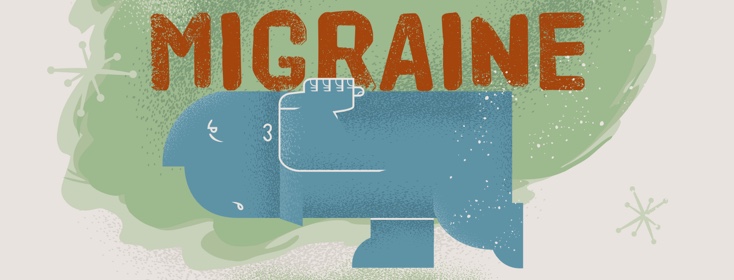Migraine is Stressful
In all the ways we talk about the relationship between stress and migraine, very little attention gets paid to a critical element: migraine itself is stressful. Individual migraine attacks are stressful, but so is just having migraine as an illness.
Everything gets put on hold with migraine
When a migraine attack comes on, everything on your to-do list gets placed on hold, no matter how important it is. You may have to scramble to get someone to cover your work or pick your kids up from school or to get home before you're too sick to make the trip. You know that you won't be able to accomplish much (or anything) during the attack itself and still won't be functioning fully in the hangover. You also feel like you’re letting people down and that they’ll have to make up for your absence.
The stress of a migraine attack
Each migraine attack brings the stress of trying to track down triggers and wondering if you did something to bring the migraine on. You worry that your meds won’t work or that you’re putting yourself at risk of medication overuse (rebound) headache. You fret over the pain that will worsen when you throw up or that you won’t be able to find a place to do so.
Featured Forum
View all responsesFight or flight?
In addition, your body is under increased stress during a migraine attack. It’s in a heightened state as if preparing to fight or to flee. Some health care providers believe that your body is in flight or fight through the duration of a migraine attack. That’s intended as short-term protection; keeping it up for hours is exhausting. Whether or not you agree with that idea, migraine causes a hyper-reactivity in the brain. Everything that you’re exposed to causes a heightened response. How can that not be stressful?
Stress between migraine attacks
Between attacks, there’s a different kind of stress, even if you only have a few attacks a year. You never know when one is going to come on, so you’re always on the lookout to be sure you catch it early.
Looking for the warning signs of an oncoming migraine
My husband has episodic migraine. Even when he was down to six attacks a year, he’d check for an aura several times a week. Every time he sees a floater or flashing light, he gets a small adrenaline release. Whether you have a visual aura or not, your pre-migraine symptoms become a shadow. Every time you yawn excessively or get hyper or your feet get cold, you worry a migraine is coming on.
The stress of migraine triggers
Managing triggers can also be stressful. Making sure you keep to a consistent sleep schedule can mean skipping out on gatherings with friends or rushing home before the party is over. Maintaining a routine of regular exercise and eating at specific times are a daily time crunch. If you have food triggers, you have to be vigilant about everything you eat, looking for hidden ingredients and probably avoiding some of your favorite foods.
The stress of chronic migraine
Frequent or chronic migraine adds another layer of stress. You know your life will be disrupted on a regular basis, that you will make plans and probably have to cancel them. You know that you won't be able to get to your to-do list, maybe for a week or a month or even a year. There’s the stress of feeling like a burden to the people you love most. And the distress of feeling like you aren't a productive member of society who can carry their own weight.
Cut yourself some slack
The next time you're feeling at the end of your rope with migraine, remember that it's an additional stressor in your life and, like Sarah recently recommended, try cutting yourself some slack. This won't eliminate the stress of an attack entirely, of course. The body is still in turmoil, which causes stress. Changes in the brain affect our moods, emotional regulation, ability to be rational. Cognitive dysfunction makes it easier to fall into negative habits, thought patterns, or beliefs. That's plenty of unavoidable stress without obsessing over what you might have done to bring the migraine attack on or everything you're not getting done while you're curled up in a dark room.

Join the conversation